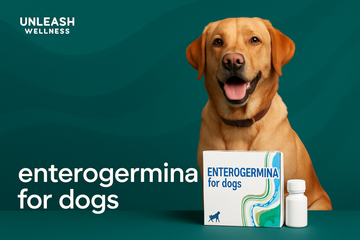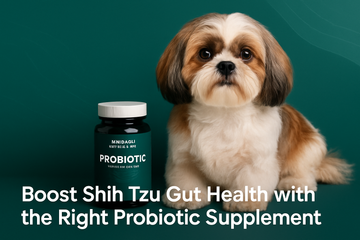Pet owners across India often find themselves in challenging situations when their beloved dogs experience digestive issues. While reaching for familiar human medications might seem like a quick solution, the question of whether enterogermina for dogs is safe and effective requires careful consideration. Enterogermina, a popular probiotic supplement containing Bacillus clausii, has gained attention among pet parents seeking relief for their canine companions' gastrointestinal problems. However, understanding the science behind this product, its appropriate use in dogs, and safer alternatives specifically designed for pets is crucial for making informed decisions about your dog's health.
What is Enterogermina and How Does It Work for Dogs
Enterogermina for dogs stands out among probiotic supplements due to its unique composition and mechanism of action. According to 2020 research from India, Enterogermina contains 2 billion spores of Bacillus clausii, a spore-forming bacterium that survives gastric acidity to colonize the intestine. This remarkable survival ability sets it apart from many other probiotic formulations that may not withstand the harsh acidic environment of the stomach.
The spore-forming nature of Bacillus clausii in enterogermina for dogs means these beneficial bacteria can remain dormant during their journey through the acidic stomach environment, only activating once they reach the more hospitable conditions of the intestines. This targeted delivery system has made it an attractive option for addressing digestive issues in both humans and, increasingly, pets.
Pro Tip: Spore-forming probiotics like Bacillus clausii have a significant advantage over vegetative probiotics because they don't require refrigeration and maintain their potency longer, making them more practical for pet owners.
When beneficial bacteria successfully colonize the intestine, they support canine digestive health through multiple mechanisms. Research from 2019 in the United States demonstrates that probiotic bacteria can reduce intestinal inflammation in dogs by up to 30%. These beneficial microorganisms work by competing with harmful bacteria for nutrients and attachment sites, producing antimicrobial substances, and supporting the immune system's response in the gut.
However, it's important to understand that significant differences exist between human and veterinary probiotic formulations. 2022 European veterinary guidelines indicate that veterinary probiotics often include strains like Lactobacillus acidophilus tailored for dogs, differing from human formulations by 40% in strain specificity. This variation highlights why probiotics for dog diarrhea may require different approaches than those designed for human consumption.
Key Takeaway: While Enterogermina's spore-forming bacteria offer unique advantages, the strain specificity differences between human and canine digestive systems suggest that pet-specific alternatives may provide more targeted benefits.
Benefits and Uses of Enterogermina for Dogs
The primary appeal of using enterogermina for dogs lies in its potential to support digestive health during challenging periods. One of the most compelling applications involves digestive support during antibiotic treatment. A 2021 Indian veterinary study found that probiotics administered with antibiotics prevented diarrhea in 68% of treated dogs, highlighting the significant protective benefits these supplements can provide.
Antibiotics, while essential for treating bacterial infections, often disrupt the natural balance of gut bacteria in dogs. This disruption can lead to antibiotic-associated diarrhea, digestive upset, and compromised immune function. Digestive supplements for canines containing beneficial bacteria help restore this balance more quickly, potentially reducing the duration and severity of digestive side effects.
For managing diarrhea and gastrointestinal upset specifically, the evidence supporting Bacillus-based probiotics is particularly strong. A 2018 global meta-analysis revealed that Bacillus-based probiotics reduced diarrhea duration by 1.5 days in canines. This reduction can significantly improve both the pet's comfort and the owner's peace of mind during stressful illness periods.
|
Benefit |
Duration of Improvement |
Success Rate |
|---|---|---|
|
Antibiotic-associated diarrhea prevention |
Throughout treatment |
68% |
|
Acute diarrhea duration reduction |
1.5 days shorter |
Variable |
|
Gut inflammation reduction |
2-4 weeks |
30% reduction |
The broader implications for gut health for pets extend beyond acute digestive issues. A 2023 Australian study demonstrated that regular probiotic use improved gut microbial diversity in 75% of dogs. This improvement in microbial diversity correlates with better overall health outcomes, including enhanced immune function, improved nutrient absorption, and greater resistance to pathogenic bacteria.
Pro Tip: The timing of probiotic administration matters significantly. For best results during antibiotic treatment, give probiotics 2-3 hours after antibiotic doses to maximize beneficial bacteria survival.
Supporting overall gut microbiome balance represents perhaps the most important long-term benefit of bacillus clausii in dogs. The gut microbiome plays a crucial role in digestion, immune system development, and even behavioral health in canines. When this delicate ecosystem becomes imbalanced due to stress, dietary changes, illness, or medication, targeted probiotic intervention can help restore harmony more quickly than natural recovery alone.
Dosage Guidelines and Safety Considerations
Determining appropriate dosing for enterogermina for dogs requires careful consideration of multiple factors, including the dog's size, health status, and the specific condition being addressed. 2024 Indian pet health guidelines recommend that for small dogs under 10kg, probiotic doses typically range from 1-2 billion CFU daily, providing a baseline for dosage considerations.
However, this canine probiotic dosage guide represents only a starting point, as individual dogs may respond differently to probiotic supplementation. Factors such as the severity of digestive issues, concurrent medications, and the dog's overall health status all influence optimal dosing strategies. Larger dogs generally require proportionally higher doses, while puppies may need modified approaches due to their developing digestive systems.
Dosage Guidelines by Weight:
-
Small dogs (under 10kg): 1-2 billion CFU daily
-
Medium dogs (10-25kg): 2-4 billion CFU daily
-
Large dogs (25-45kg): 4-6 billion CFU daily
-
Giant breeds (over 45kg): 6-8 billion CFU daily
When considering safe probiotics for puppies, additional caution is warranted. Puppies have developing immune systems and may be more sensitive to changes in their gut microbiome. Starting with lower doses and gradually increasing while monitoring for any adverse reactions provides the safest approach for young dogs.
Potential side effects, while generally mild, do occur in some dogs receiving probiotic supplementation. A 2020 U.S. veterinary report documented that mild side effects like bloating occurred in 5% of probiotic-treated dogs. Other potential side effects include temporary digestive upset, gas, or changes in stool consistency during the initial adjustment period.
Pro Tip: Start with half the recommended dose for the first 3-5 days to allow your dog's system to adjust gradually, then increase to the full dose if no adverse reactions occur.
More serious contraindications exist for dogs with compromised immune systems, those receiving immunosuppressive medications, or animals with severe underlying health conditions. In these cases, introducing live bacteria into the system could potentially cause complications rather than benefits.
The importance of veterinary consultation cannot be overstated when considering enterogermina for dogs. A 2022 survey found that 88% of pet owners in India consult vets before using supplements, reflecting growing awareness of the importance of professional guidance. Veterinarians can assess individual risk factors, consider potential drug interactions, and recommend appropriate dosing strategies based on the specific dog's needs.
Key Safety Considerations:
-
Always consult your veterinarian before starting any new supplement
-
Monitor for adverse reactions during the first week of use
-
Avoid use in immunocompromised animals without veterinary supervision
-
Store probiotics according to manufacturer instructions to maintain potency
Veterinary-Approved Alternatives to Enterogermina for Dogs
The growing awareness of pet gut flora restoration needs has driven significant innovation in the Indian pet supplement market. According to industry data, the Indian pet supplement market grew by 25% in 2023, with probiotics accounting for 15% of sales. This growth has resulted in numerous dog-specific probiotic supplements becoming available, offering alternatives specifically formulated for canine digestive systems.
These veterinary-approved alternatives often contain strains specifically selected for their effectiveness in dogs, such as Lactobacillus acidophilus, Bifidobacterium animalis, and Enterococcus faecium. Unlike human-formulated products, these canine gastrointestinal support options are designed with canine physiology in mind, considering factors like stomach pH, intestinal transit time, and species-specific nutritional requirements.
Unleash Wellness has emerged as a notable player in this space, offering scientifically formulated pet wellness products that prioritize gut health alongside overall canine wellbeing. Their approach combines veterinary expertise with natural formulations, creating supplements that address the specific needs of Indian dogs while maintaining safety and efficacy standards.
Natural Remedies for Dog Upset Stomach:
Natural digestive health solutions represent another important category of alternatives. A 2021 UK study found that natural probiotics like fermented foods improved digestion in 60% of dogs. These natural remedies dog upset stomach options include:
-
Plain yogurt with live cultures (in small amounts)
-
Fermented vegetables like sauerkraut (unsalted)
-
Bone broth with added beneficial bacteria
-
Prebiotic-rich foods like pumpkin and sweet potato
However, natural doesn't always mean safer or more effective. The advantage of scientifically formulated products lies in their standardized potency, quality control, and research-backed formulations. Recent data shows that scientifically backed pet products increased usage by 35% among Indian owners in 2024, reflecting growing preference for evidence-based pet care solutions.
When choosing between alternatives, consider these factors:
|
Factor |
Canine Products (like Enterogermina for dogs ) |
Pet-Specific Products |
Natural Options |
|---|---|---|---|
|
Species-specific formulation |
No |
Yes |
Variable |
|
Dosage guidelines for dogs |
Limited |
Clear |
Inconsistent |
|
Safety data in canines |
Limited |
Extensive |
Traditional use |
|
Veterinary support |
Cautious |
Recommended |
Case-by-case |
Dog Microbiome Balance Tips for long-term digestive health extend beyond supplementation alone. Maintaining a consistent, high-quality diet, providing adequate exercise, minimizing stress, and avoiding unnecessary antibiotic use all contribute to a healthy gut microbiome. Regular veterinary check-ups can help identify digestive issues early, allowing for prompt intervention before problems become severe.
For pet owners considering veterinary probiotics india market options, consulting with local veterinarians familiar with available products provides the best guidance. Many veterinary clinics now stock pet-specific probiotic supplements and can recommend products based on individual dog needs and local availability.
The key to successful pet gut flora restoration lies in choosing products specifically designed for canine physiology, following appropriate dosing guidelines, and maintaining realistic expectations about outcomes. While probiotics can provide significant benefits for many dogs, they work best as part of a comprehensive approach to digestive health that includes proper nutrition, regular exercise, and preventive veterinary care.
Frequently Asked Questions
Q: Is enterogermina safe for dogs to consume regularly?
A: While Enterogermina for dogs contains beneficial Bacillus clausii bacteria, it's formulated for humans and lacks specific safety data for long-term canine use. Pet-specific probiotics offer better safety profiles and dosing guidelines designed for dogs. Always consult your veterinarian before giving any human supplement to your dog.
Q: How quickly can I expect to see results when giving probiotics to my dog?
A: Most dogs show initial improvement in digestive symptoms within 3-7 days of starting probiotic supplementation. However, full microbiome rebalancing typically takes 2-4 weeks. Factors like the severity of the condition, the dog's overall health, and consistency of administration all influence response time.
Q: Can I give enterogermina to my puppy for diarrhea?
A: Puppies have developing digestive and immune systems that may react differently to probiotics designed for humans. Veterinary-approved puppy probiotics are specifically formulated for young dogs' needs and provide safer alternatives with appropriate dosing guidelines for developing systems.
Q: What's the difference between probiotics and prebiotics for dogs?
A: Probiotics are live beneficial bacteria that colonize the gut, while prebiotics are non-digestible fibers that feed existing beneficial bacteria. Many effective digestive supplements combine both (called synbiotics) to provide comprehensive gut health support for optimal microbiome balance.
Q: Should I stop giving probiotics if my dog's symptoms worsen?
A: Yes, discontinue use immediately if symptoms worsen or new concerning symptoms appear. Some dogs may experience initial mild digestive adjustment, but worsening conditions could indicate an adverse reaction or underlying health issue requiring veterinary attention.
Q: How do I choose between human probiotics and dog-specific products?
A: Dog-specific probiotics offer several advantages including species-appropriate bacterial strains, proper dosing guidelines, safety testing in canines, and veterinary support. While human probiotics like enterogermina may provide benefits, pet-specific formulations are designed for canine physiology and typically offer better outcomes.
Q: Can probiotics interact with my dog's medications?
A: Probiotics can potentially interact with certain medications, particularly antibiotics and immunosuppressive drugs. The timing of administration matters significantly – probiotics should typically be given 2-3 hours after antibiotics. Always inform your veterinarian about all supplements when discussing your dog's medication regimen.
Conclusion
While enterogermina for dogs may offer some digestive benefits due to its Bacillus clausii content, the evidence strongly supports choosing veterinary-approved alternatives specifically formulated for canine health. The 25% growth in India's pet supplement market this year reflects increasing awareness among pet owners about the importance of species-specific health solutions.
Rather than adapting human medications for your dog, consider the scientifically formulated options like Jolly Gut from Unleash Wellness, which combine veterinary expertise with natural ingredients designed specifically for canine digestive health. Remember that successful gut health management requires a comprehensive approach including proper nutrition, regular exercise, stress management, and professional veterinary guidance. Your dog's digestive health is too important to leave to guesswork – invest in products and practices backed by veterinary science for the best long-term outcomes.





